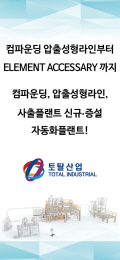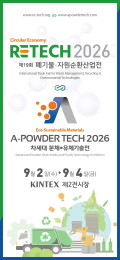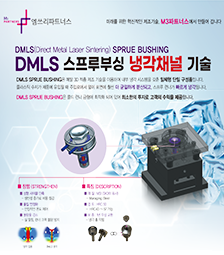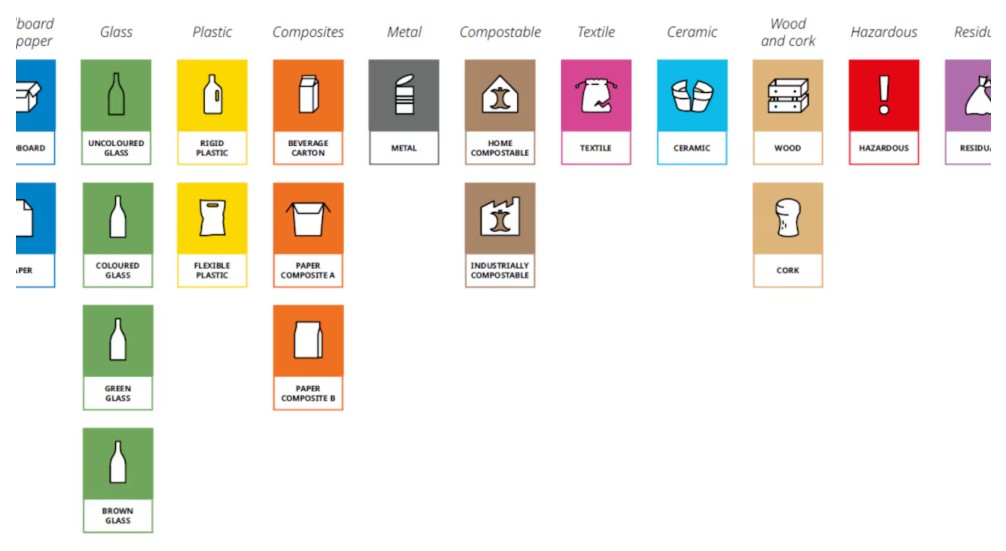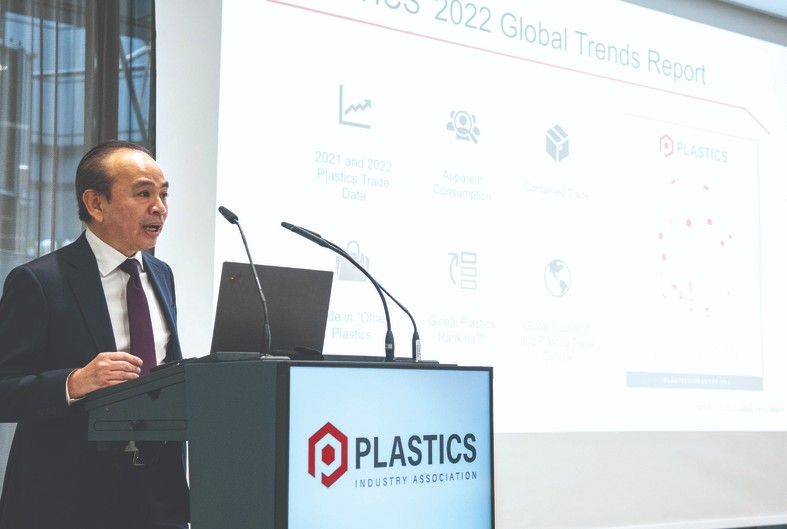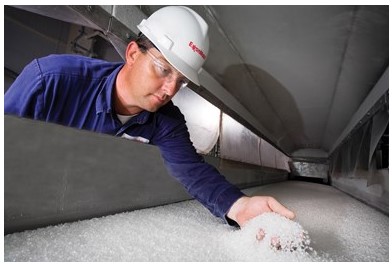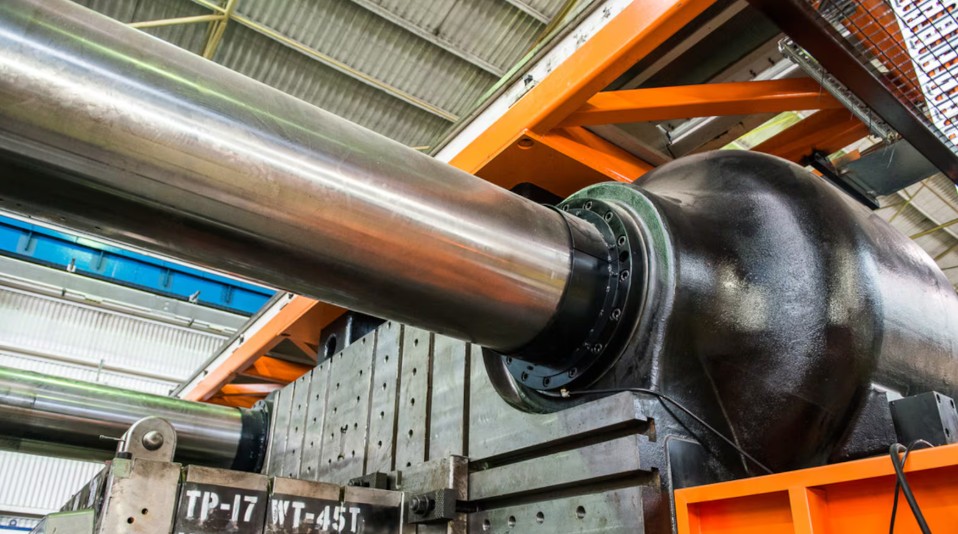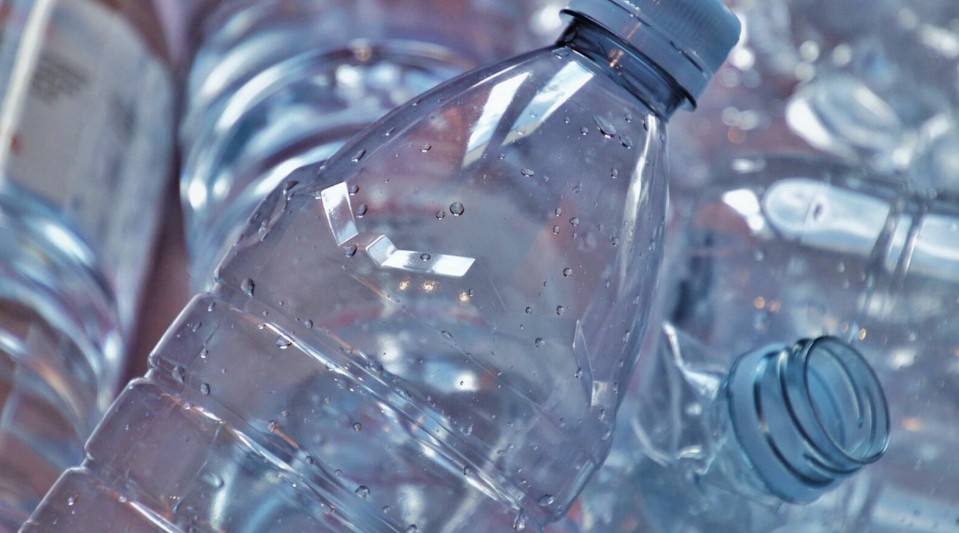Market trends
Plastics industry seeks infrastructure dollars for recycling
작성자 : Aeyoung Park
2018-09-21 |
조회 : 5184
Scott DeFife, vice president of government affairs for the Plastics Industry Association,
addresses the crowd before the industry's annual lobbying day. (Plastics Industry Association)
Plastics industry executives fanned out over Washington Sept. 12 for their annual lobbying day with a new message: a push for more federal government spending on recycling to try to address public concerns about plastics in the environment.
The lobbying fly-in traditionally focuses on more pocketbook issues like trade policy, worker training and regulation, and those remained high on the agenda for the more than 100 executives who took part.
But rising concerns over plastic waste and worries over bans or taxes on plastic packaging led to an expanded focus this year.
"Recycling infrastructure is really the new key point that we want to raise," said Scott DeFife, vice president of government affairs for the Washington-based Plastics Industry Association, the lead organizer among five trade associations at the event.
For the industry groups, that means pushing for Congress and President Donald Trump's administration to change how Washington views federal infrastructure spending.
Instead of being a vehicle mainly for building things like roads and airports, they want some federal infrastructure spending to be earmarked for city and state recycling operations such as materials recovery facilities and waste to energy plants.
"We're saying some infrastructure spending should be on recycling, waste to energy, whatever needs to be done to properly handle plastic waste," said Chairman Wylie Royce. "On top of that you're creating recycling jobs."
DeFife said the effort is in its very early stages and the association is still putting together detailed legislative proposals.
But including it as part of lobbying day is another sign of how waste issues are taking a higher profile for industry groups: the CEO of the American Chemistry Council, for example, in June said he was delaying his planned retirement specifically to work on plastics waste issues.
DeFife said the federal government should see the global trade in recyclables as it sees world trade in wheat or other farm commodities.
"In D.C. they think of infrastructure as roads and bridges, and we're trying to get them to think of our material as an asset," DeFife said. "It should be invested in."
Fred Daniell, president of Kureha America LLC, meets West Virginia Sen.
Shelley Moore Capito during the plastics industry's Sept. 12 Washington lobbying fly-in.
(Plastics Industry Association)
Trade policy
The lobbying day officially had three priorities: trade, workforce and infrastructure.
On trade policy the industry returned to a familiar theme, in general supporting free trade, but with a nuanced position that not all industry sectors see it the same way, particularly around China.
"As an association we want to promote free trade, we're basically free traders," said Royce, who is senior vice president of colorant supplier Royce Global in East Rutherford, N.J. "We don't see a whole lot of value to tariffs. Obviously, there are some unique situations that we can understand."
DeFife said there's a "broad consensus" among the association companies in support of not putting new tariffs on trade with Canada and Mexico as part of any revamped North American Free Trade Agreement.
While the Trump administration and Mexico have announced the outlines of a new trade agreement between the two countries, DeFife said the plastics industry wants Canada in any new version of NAFTA.
"The goal is we want to maintain positive trade relations and not create turmoil in the industry, in North America," DeFife said.
But the Trump administration's tariffs on $50 billion in Chinese imports and plans for tariffs on another $200 billion that could be enacted this month, have divided the industry.
The American Chemistry Council, which was part of the lobbying day, has argued strongly against tariffs on China, in part because it fears retaliation from Beijing will close off the Chinese market to U.S. resin exports.
But others, particularly plastics processors like packaging company Pactiv LLC and some large vinyl flooring makers, testified at government hearings in favor of tariffs on Chinese imports.
The industry is worried about tariff fights damaging the overall economy and undoing positive gains the industry has made, including positives from the federal tax cut, and would prefer a resolution and non-tariff ways of addressing concerns about China, DeFife said.
"Retaliatory tariffs escalating doesn't end well," he said. "Don't let it spin out of control, to the point that you damage the economy and damage the positive gains that the industries have."
Some participants in the plastics industry's annual Washington lobbying day Sept. 12,
on the steps in front of the Capitol building. (Plastics Industry Association)
Plastic pipe
Another topic pushed by the executives was changes in federal laws to support more competition in government infrastructure for pipe.
It's the second year that "open competition" in pipe has been on the industry's lobbying day agenda, and the group sees it leveling the playing field for plastic pipe in government purchasing, said Tony Radoszewski, president of the Irving, Texas-based Plastics Pipe Institute.
"A lot of the specifications are written around concrete and iron materials," he said.
As well, the industry was using the event to tell lawmakers about the plastic pipe industry's increasing use of recycled content in storm water pipes, up to 40 percent in some cases, he said.
"We want to start broadcasting the fact that we believe up to 35 percent of curbside recycled bottles goes to corrugated [high density polyethylene] pipe," Radoszewski said.
In a statement for the lobbying event, PPI said recycled content pipes perform as well as pipe made with virgin HDPE and can be a way for governments to reduce the environmental impact of large storm drainage projects.
"Our industry takes a product that has a 60-day shelf life and turns it into a product with a 100-year service life," he said.
Building connections
Apart from talking specific points with legislators, executives also said they saw value in building longer term connections and supporting the overall industry.
Norm Forest, the president of the Manufacturers Association for Plastics Processors, said the Indianapolis-based group is not a lobbying organization, so he said it was difficult for MAPP to speak on hot button issues like trade. It brought about a dozen members to the lobbying day.
"I'm here to participate in supporting the Plastics Industry Association and share with my Congress people," said Forest. Speaking for his company, he said supporting legislation on training and apprenticeships is a key issue.
The event attracted about 130 participants, which DeFife said was a record. The date was moved this year to coincide with the plastics association's annual Washington board meeting, which could have boosted turnout.
Royce also said the charged political atmosphere in the country may be increasing interest among executives, even with what is generally strong business conditions.
"The general industry mood and business mood is very, very positive, but what I'm also seeing is there's more political activism in the world than we've ever seen," Royce said. "I think people are starting to realize that we need to talk to our representatives and we need to deal with them and they have to understand our position. It's the old adage 'If you're not at the table, you're on the menu.'"

